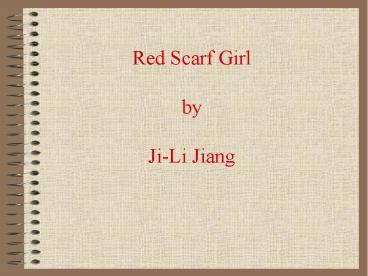Red Scarf Girl by Ji-Li Jiang PowerPoint PPT Presentation
Title: Red Scarf Girl by Ji-Li Jiang
1
Red Scarf GirlbyJi-Li Jiang
2
(No Transcript)
3
(No Transcript)
4
Time Line of Modern China
- Establishment of the Peoples Republic of China
- Chairman Mao Zedong formed government.
- Mao began land-redistribution giving peasants
land formerly owned by landlords. - He built new industries.
5
1956- 1957 The Hundred Flowers Movement and
Anti-Rightist Campaign
- Mao invited the public to criticize government
officials. - Criticism was much harsher than expected and
attacks Maos leadership. - Mao cracked down on hundreds of thousands of
people, mostly labeled intellectuals who were
sent to labor reform camps.
6
1958-1960 The Great Leap Forward
- Mao designed a plan to rapidly modernize China.
- Mao ordered rural Chinese to form communes to
farm the land and operate industry more
efficiently. - Maos over zealous implementation of policies
and bad weather resulted in massive famine
causing the deaths of 20 million Chinese.
7
1962-1965 Maos doubts about Chinas future
began to grow
Chairman Mao was increasingly unhappy about the
direction China was taking since Great Leap
Forward and now thought that China was in
endanger of returning to capitalism.
8
1966 The Cultural Revolution Begins
- The Red Guards swear to destroy the Four Olds
- Old Culture
- Old Customs
- Old Habits
- Old Ideas
Bound Feet
9
Students were encouraged to learn Maos sayings
and to criticize their teachers and Party
officials.
10
Old artifacts were destroyed to make room for the
new.
11
Teachers, professionals, Party officials and
other black elements were humiliated,
criticized, and sometimes physically beaten.
12
(No Transcript)
13
1968 Red Guards
- Students from high schools and universities who
swore loyalty to Mao spontaneously formed Red
Guard units. - The Red Guard was given the freedom to criticize
whomever they wished. - Red Guard started fighting amongst themselves.
- Mao sent in the army to bring order to the
cities. - As many as 16 million young people from the
cities were sent to the rural areas to be
re-educated by the peasants.
14
1968-1972 Political Violence Continued
- Political campaigns were started to restore
order and settle old scores from the first years
of the Cultural Revolution. - An estimated 1.5 to 2 million people were killed
during this time. - The army was actively involved or stood by while
the violence occurred.
15
1976 Chairman Mao died, and the Cultural
Revolution ended.
Mao left Hua Guofeng is put in charge. Hua
Guofeng arrested The Gang of Four including
Maos wife. Hua stated that this marked the
formal end of the Cultural Revolution.
16
Deng Xiaoping emerged as Chinas most powerful
leader.
- Originally sent to the countryside to be
re-educated for being disloyal to Mao, Deng
reemerged and reversed Maos policies. - University entrance exams were re-established.
- Youth sent to the countryside were allowed to
return to the cities. - Over the next decade China embarked on economic
reform and opened up to the outside world.
17
Consequences of the Cultural Revolution
- Millions of people suffered and died.
- Many victims who were committed to finding
another way for developing China came to power. - The Cultural Revolution destroyed the idea that
radical Communism was the way for economic
development. - Economic reforms after the Cultural Revolution
in the 1980s improved the lives of many of the
Chinese people. - China is now involved in the global economy.
18
The Cultural Revolution and The Red Scarf Girl
In 1966, Chairman Mao Zedong launched the
Cultural Revolution, a political movement and
power struggle that lasted for ten years. The
Cultural Revolution was Maos attempt to renew
revolutionary passion and purify the Communist
party of supposedly bad influences. Mao closed
Chinas schools and called for the formation of
the Red Guards, an organization of high school
and college students that would enforce true
Communist values. The Red Guards terrorized their
communities. They accused educated peoplesuch
as teachers, writers, doctors, and artistsof
being enemies of Communism. Families that had
once been wealthy, even several generations back,
were publicly humiliated and physically attacked.
Children were forced condemn their own parents.
Millions of people were sent to the countryside
to be reeducated by doing hard labor on farms.
The Cultural Revolution caused widespread
social and economic chaos. Young people like
Ji-li Jiang who grew up during those years have
been called Chinas lost generation.
19
1973 President Richard Nixon visited China
President Nixons visit signaled an end to
Chinese isolation from the West.

